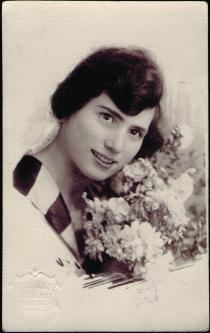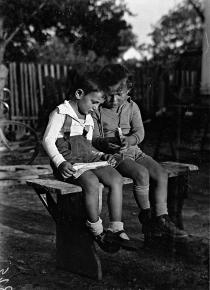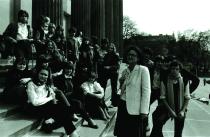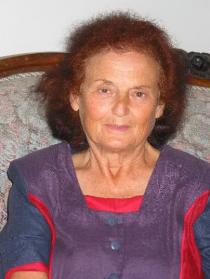Ilona Gardonyi’s family (Judit Kinszki’s mother)
My mother with her siblings. [They were nine siblings.] The oldest [child] was Sanyi, he graduated from some kind of academy of commerce and became a head book-keeper. He had two children. Sanyi and one of his sons were taken away by the Germans, sometime after '42; they were in a truck driving through a forest, and his son, a 17-year-old lad, said that it was time to run away. Sanyi didn't dare, but his son jumped off the truck, ran into the forest and later joined the partisans, so he stayed alive. We don't know anything about Sanyi.
There was Fredi, who was a doctor in Zuglo. His wife's name was Krisztina Eckstein. There were very rich men out there in Zuglo. The parents had a transport company. Kriszta used to play tennis, and they went to the Tatras in the winter, and she loved to play bridge -she was the bourgeois member of the family. During the First World War Fredi was a doctor and he was wounded, and was therefore considered a war casualty. He got a very high decoration and he was free [from the anti-Jewish laws], and when he had to hide away too, his wife's lover hid the whole family.
Then there was Lajos, he was a baker. His wife was a trader, a goose meat packer. Lajos was a very proud Hungarian, he had a twisted moustache and everything. And he said [during the Holocaust] -I can still hear his words- "Now I'm a stepson of my dear Motherland, but there will be a time when I'll be a full-blooded son of my dear Motherland". He was taken into forced labour service, and he disappeared, and never came back.
Then there was Jeno, he was a tailor. He also received high decorations from the First World War, and for a while, far from being taken to forced labour service he was a member of the skeleton staff. But then he was also taken away, and he disappeared and never returned. He had two children, but both died.
Then my mother Ilus came. The next one was Imre; he was a doctor too. [In the Second World War] he became a POW of the Russians very quickly. He said that the Russians were very kind to him. Well, they respected a doctor. He came back and became the director of the district surgery here in Zuglo. He lived with us, and he was like a father to me. He got married and died very suddenly, in '53.
Then there was Erzsi. She was an official, the head of a music shop, all her life. She was an educated and intelligent woman. She was taken away and didn't come back.
Then there was Gyongyi, one of a pair of twins, but her twin sister died at birth. She was a lamp-shade maker. Her husband was Zsigmond Krausz; he also died [during the Holocaust], but Gyongyi came back, and she got married again, and died of cancer very quickly. Maybe it was because they had done experiments on her in Germany, because she was a twin.
The last one was Aranka. She had a profession; I think she was a glove-maker. She got married - it was a forced marriage; she felt very old, and chose to be the wife of a man called Pollak. She was always saying that she didn't love him. She had two children, and the relatives are still alive, somewhere.



































































































